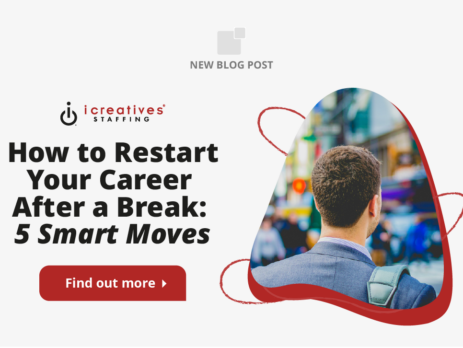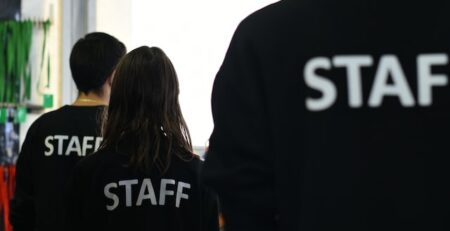How to Restart Your Career After a Break: 5 Smart Moves
Taking a career break can be a conscious choice or an unexpected detour. Whether due to personal reasons, health, family, or simply the need for rest, many professionals step away from their careers at some point. Returning to the workforce, however, often feels daunting. The professional landscape changes quickly, and the idea of catching up can be overwhelming.
Despite these challenges, restarting your career after a break is entirely possible with the right strategy. Employers today are becoming more open-minded about non-linear career paths, especially as industries continue to evolve. What matters most is demonstrating adaptability, relevant skills, and confidence in your value.
One of the key aspects of re-entering the workforce successfully is planning. A structured approach can help you regain your footing faster, rebuild your professional identity, and position yourself as a strong candidate. It’s about aligning past experiences with current demands and showing how your journey adds unique value.
In this guide, we’ll explore five smart moves that can help you restart your career after a break. From brushing up your skills to using professional networks effectively, these strategies will empower you to re-establish yourself and thrive in your chosen industry.
By the end of this article, you’ll not only have actionable steps to make your comeback smoother but also resources and insights that can boost your confidence as you re-enter the professional world. Let’s get started.
Most Asked Questions About Restarting Your Career
- How do I explain a career break to potential employers?
- What skills should I update when restarting my career?
- How can I network effectively after being out of the workforce?
- Is hiring a career coach worth it after a break?
- How do I build confidence when re-entering the job market?
How do I explain a career break to potential employers?
Explaining a career break to potential employers is often one of the biggest concerns professionals face when returning to work. The key is to frame your break in a way that highlights growth, transferable skills, and readiness to contribute immediately.
First, be honest without oversharing. Employers appreciate transparency but don’t need a detailed personal story. Instead, focus on the constructive aspects of your break, such as caregiving, personal projects, education, or volunteering.
Use your resume strategically. Rather than leaving gaps, consider including relevant activities you pursued during your break. For example, freelance work, courses, certifications, or even volunteer roles that kept your skills active should be listed.
When asked in interviews, keep your explanation brief and pivot quickly to how you are prepared for the role. This demonstrates that you acknowledge the break but are focused on moving forward.
Employers today are increasingly valuing adaptability. If your break included learning new technologies or adapting to personal changes, that flexibility becomes an asset. For example, you can connect your adaptability to resources like this guide on performance reviews which highlights resilience as a critical workplace trait.
It’s also helpful to prepare a short “career break statement.” This can be one or two sentences you consistently use when asked. For example: “I took a career break to care for a family member, during which I also completed professional training to stay updated. Now, I’m excited to bring renewed focus and fresh skills to this role.”
Here’s a quick comparison table to help you practice:
| Wrong Approach | Better Approach |
| “I wasn’t working for three years because of personal reasons.” | “I took a three-year career break during which I completed [course/certification] and am now fully ready to rejoin the workforce.” |
In written applications, your cover letter is an excellent place to briefly acknowledge your break and immediately highlight why you’re a great fit for the role.
Remember: Employers are hiring you for your future contributions, not your past gaps. Confidence and clarity in your explanation are more important than the break itself.
With the right framing, your break can even set you apart—showing resilience, adaptability, and a fresh perspective that many long-term employees may lack.

What skills should I update when restarting my career?
When re-entering the job market, updating your skills is often the fastest way to regain competitiveness. Industries evolve quickly, and employers want candidates who are up to speed with the latest tools and practices.
Start with technical or digital skills relevant to your field. For example, someone in marketing might need to learn about automation platforms, while a designer might focus on new UX/UI tools. Platforms offering certifications are invaluable here.
Don’t neglect soft skills. Communication, leadership, and adaptability are often just as important as technical expertise. Resources like this salary competitiveness guide show how aligning your skills with market value enhances employability.
Networking with industry peers can help identify which skills are most in demand. Ask colleagues or mentors what tools or certifications are commonly expected.
Upskilling doesn’t have to be expensive. Many online platforms offer free or affordable courses on coding, data analysis, leadership, and even AI applications.
To organize your skill development, make a priority list. Focus on high-impact skills that directly align with your target job. For instance, if transitioning industries, start with transferable skills that bridge your past experience with new requirements.
Soft skills like adaptability and emotional intelligence are especially valuable for those returning after a break. Employers want to see that you can integrate smoothly into evolving team dynamics.
Practical application matters. Apply new skills in small projects, freelance work, or volunteering. These experiences can be added to your resume as evidence of your continuous development.
Consider seeking feedback from professionals in your field. This helps confirm whether your newly acquired skills meet current standards.
Ultimately, updating skills is not just about knowledge but also about signaling to employers that you are proactive and future-ready.
How can I network effectively after being out of the workforce?
Networking after a career break requires intentionality. Since you may have lost touch with professional circles, rebuilding connections should be a priority. The good news is that networking today extends far beyond in-person events.
Start with your existing contacts. Reach out to former colleagues, managers, and peers. A simple message letting them know you’re back in the job market can open doors.
Leverage platforms like LinkedIn to reconnect and engage. Posting content, commenting on industry updates, and joining relevant groups signal that you are active again. You might also find guidance in resources like this outsourcing article that shows how digital presence influences opportunities.
Attend both virtual and in-person networking events. Conferences, webinars, and workshops are opportunities to learn and connect with professionals in your field.
When networking, focus on offering value. Share insights, connect others, or provide resources. Networking is most effective when it’s reciprocal rather than one-sided.
Consider informational interviews. Asking professionals about their career paths and advice not only builds connections but also provides insights into industry trends.
Volunteering is another effective way to expand your network while demonstrating your skills. It gives you hands-on experience and connects you with like-minded professionals.
Don’t be afraid to mention your career break, but frame it positively. Networking conversations should highlight what you’re aiming for now rather than dwell on the past.
Set a goal to reach out to a certain number of people weekly. Consistency ensures that your efforts compound over time.
Remember: Networking is not about quantity but about meaningful relationships that support your long-term goals.
Is hiring a career coach worth it after a break?
Many professionals wonder if a career coach is necessary after a break. The truth is, it depends on your circumstances, but for many, a coach provides structure, accountability, and expert guidance during a vulnerable transition.
A career coach helps you identify strengths, clarify goals, and position yourself effectively. This is especially helpful if you’re pivoting to a new industry. You might also look at this resource on recognition that reinforces how personalized support motivates progress—similar to how a coach motivates you.
Coaches can refine resumes, craft impactful cover letters, and prepare you for interviews. They also help in addressing career gaps confidently.
One of the biggest benefits is accountability. A coach keeps you on track with timelines and ensures consistent progress toward your goals.
They can also introduce you to tools and frameworks that accelerate career readiness. From personal branding strategies to negotiation techniques, their insights are practical and results-driven.
While coaching is an investment, consider it a career accelerator. It can reduce the time spent struggling alone and help you land opportunities faster.
Group coaching or career workshops can be more affordable alternatives if individual coaching feels out of budget.
However, it’s important to vet your coach. Look for certifications, reviews, and a coaching style that aligns with your needs.
For some professionals, mentorship can serve as a substitute. A trusted mentor in your field may provide similar guidance without the cost.
In conclusion, hiring a career coach is not mandatory, but it is often worth it if you’re seeking clarity, confidence, and a structured path forward.
How do I build confidence when re-entering the job market?
Confidence is one of the biggest hurdles after a career break. The good news is that it can be rebuilt with deliberate effort and mindset shifts.
Start by reframing your break as an asset. Identify transferable skills and new perspectives you gained during that time. For example, caregiving can enhance time management and empathy.
Preparation builds confidence. Research industry trends, practice interviews, and refresh your resume. The more prepared you feel, the more confidently you will present yourself. For mindset guidance, you can explore this article on remote work management, which underscores adaptability and resilience—both crucial to confidence.
Set small, achievable goals. Every completed task, from reaching out to a recruiter to finishing a course, boosts self-belief.
Role-play interviews with friends or mentors. Practicing responses helps reduce anxiety and builds comfort.
Focus on self-care. Exercise, sleep, and mindfulness practices improve mental resilience, which directly impacts confidence.
Surround yourself with supportive peers. Join professional groups where encouragement and advice are shared openly.
Celebrate small wins. Each application sent or interview scheduled is a step forward, even if it doesn’t lead to immediate success.
Avoid negative self-talk. Replace doubts with affirmations that emphasize your strengths and readiness.
Ultimately, confidence grows through action. The more you engage with the job market, the more natural and assured you’ll feel.
Conclusion
Restarting your career after a break may feel overwhelming at first, but with the right strategies, it becomes an exciting opportunity for growth. By focusing on how to explain your break, updating critical skills, and rebuilding your network, you can step back into the workforce with clarity and strength.
Confidence plays a central role in this journey. Preparing thoroughly and setting realistic milestones helps you regain self-assurance and credibility with employers. Professional support, whether through a coach or mentor, can further accelerate your progress.
The job market today values adaptability and diverse experiences more than ever. Your career break doesn’t have to be a setback—it can be reframed as a unique asset that adds value to your professional narrative.
Using internal resources like career-building guides or external communities ensures that you have the tools and insights to stay competitive. These resources also remind you that you’re not navigating this path alone.
Patience and persistence are key. Every step you take, from updating your skills to reaching out for opportunities, compounds into meaningful progress. The journey may be gradual, but the results will be lasting.
Ultimately, restarting your career is not about going back to where you left off—it’s about moving forward into new opportunities with resilience, clarity, and renewed purpose.
In today’s competitive market, finding the right creative and marketing expert can be a challenge. But with icreatives, you’re in experienced hands. With 37 years in staffing and a track record of matching more than 10,000 employees to over 1,000 companies worldwide, we know how to connect you with the best. Plus, you only pay if you hire—there’s no risk, only results. Ready to find your perfect creative or marketing expert? HIRE WITH ICREATIVES today!












